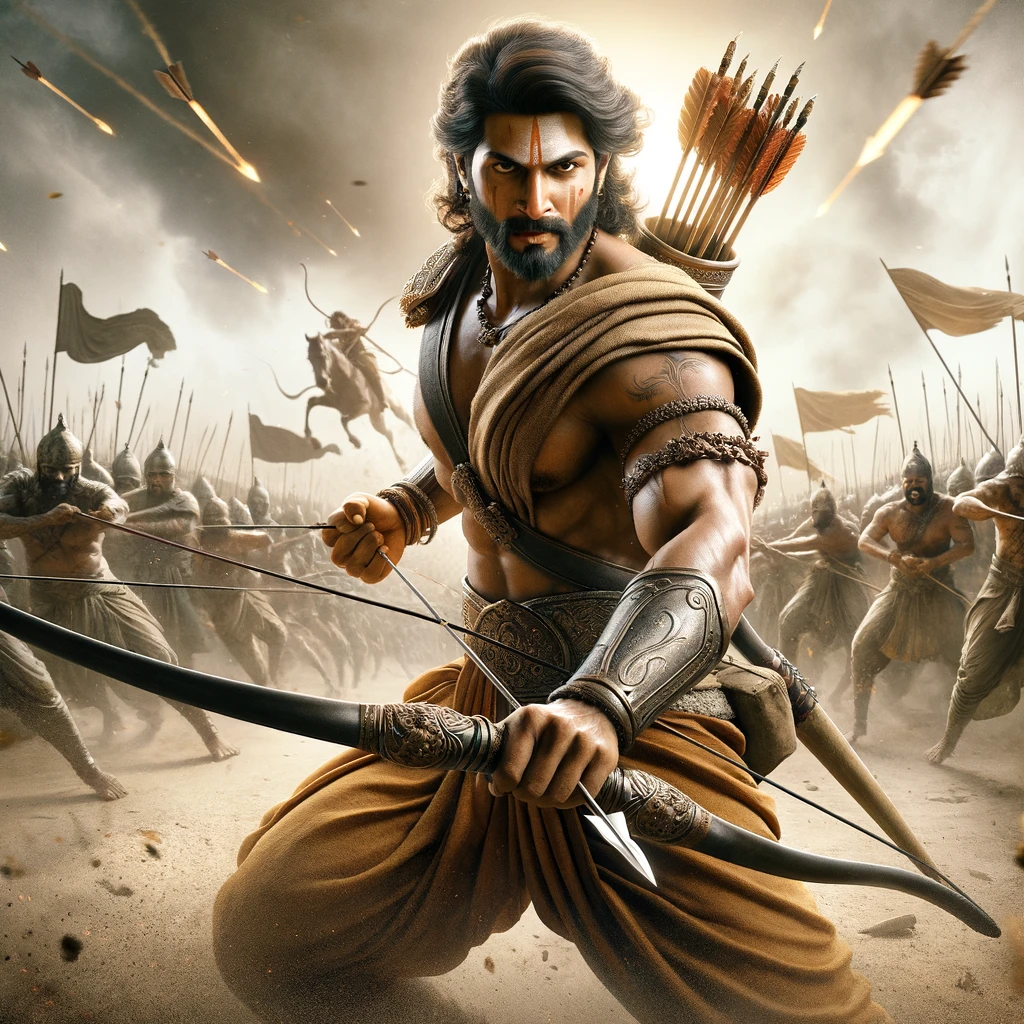Taking Lakshmana by the hand after speaking to Him in that way, Vibhishana gladly hurried off. Going not too far away, they entered the great forest. There Vibhishana showed Lakshmana the place where Indrajit was performing the sacrifice. The glorious Vibhishana showed Lakshmana a frightful-looking banyan tree that resembled a dark-blue storm cloud, saying: “After offering oblations to the spirits at this place, Indrajit proceeds to the battlefield. That Rakshasa then becomes invisible to all living beings and traps his enemies on the battleground with his fine arrows and then kills them. Using your flaming arrows, destroy Indrajit, along with his chariot, horses and charioteer, before he reaches the banyan tree.”
Saying, “So be it!” Lakshmana took His stand there, twanging His wonderful bow. Then Indrajit came into view in his brilliant chariot bearing a flag. He was clad in armor and armed with a sword. The splendorous Lakshmana then said to Indrajit, a descendent of the sage Pulastya: “I challenge you to a match! Fight with me in an honest manner!” When spoken to in this way, Indrajit uttered the following harsh words when he saw that Vibhishana was there:
“Born and raised in our race, you are my father’s brother. Why do you hate me, your nephew, O Rakshasa? You have no sense of relation, friendship, race, morality, brotherliness or virtue, O dimwit devoid of virtue! You are pitiable and deserve to be censured, for you have abandoned your own kind and are serving the enemy. With your weak intelligence you do not understand the great difference between these two: to live with one’s own people and to take shelter of others. Even if a stranger has all good qualities and a relative has none, the unqualified relative is preferable. A stranger is just a stranger. One who abandons his own people to serve the enemy is killed by the enemy after they eliminate his people. O night-stalker, such ruthlessness to indicate my weakness and your audacity to bring Lakshmana here is only possible because you are a relative, O younger brother of Ravana!”
Chided in this way by his nephew, Vibhishana replied as follows: “Why do you talk so rashly as if you do not know my character? Give up your harshness in lieu of my seniority, O impious son of Ravana! Although I was born in the family of rakshasas who perform cruel deeds, my character is not that of a Rakshasa but that of the foremost quality of humans—the mode of goodness. I do not enjoy cruelty nor do I enjoy unrighteousness. But how could a brother expel his brother, even though having a dissimilar nature? By abandoning a person of sinful resolve whose conduct has swerved from righteousness, one achieves happiness, as when one shakes off a poisonous snake from one’s hand. It is said that one should reject the sinful fellow who is intent on seizing others’ property or in having intercourse with others’ wives as one would a burning building. To take others’ possessions, to have intercourse with others’ wives and to be suspicious about friends—these three faults lead to destruction.
“The horrible slaughter of great sages, war against all the gods, pride, anger, animosity and contrariness—these faults which destroy one’s life and power, are my brother’s qualities, covering his good qualities as a cloud covers a mountain. I abandoned my brother, your father, because of those faults. This city of Lanka will not last long, nor will you or your father. Proud, childish and ill-mannered, say whatever you wish to me, for you are already bound by the noose of death. This calamity has now overtaken you because of your harsh words to me. You will not be able to reach the banyan tree, O lowest or rakshasas! After attacking Lakshmana, you will not be able to survive. Fight with Prince Lakshmana on the battlefield. When killed, you will go to the abode of death, thus accomplishing the goal of the gods. Display your fully developed strength so that your weapons are all depleted. However, when you come within the range of Lakshmana’s arrows, you will not come out alive with your army.”
Thus completes 87th Chapter of Yuddha Kanda of the glorious Ramayana of Valmiki, the work of a sage and the oldest epic.
Sriman Moola Rama Vijayate


